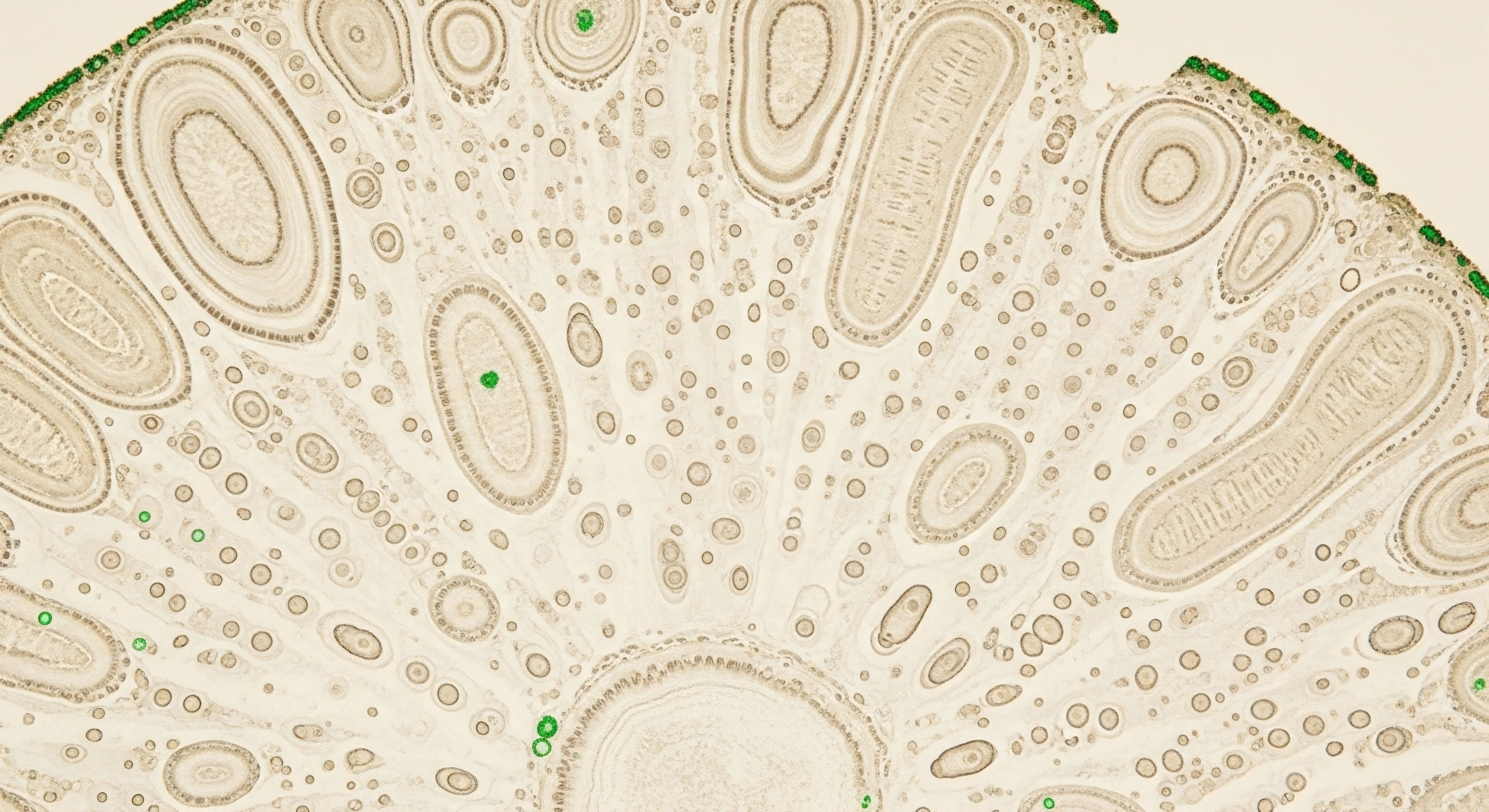

Fundamentals
The persistent feeling of imbalance, the frustrating unpredictability of your body’s rhythms, and the quiet worry about what these symptoms signify for your future well-being can be profoundly isolating. Perhaps you have experienced irregular menstrual cycles, noticed unwelcome changes in your skin or hair, or struggled with weight management despite diligent efforts. These experiences are not merely inconveniences; they are signals from your intricate biological systems, often pointing towards a condition known as Polycystic Ovary Syndrome, or PCOS.
This complex endocrine disorder affects millions, presenting a unique set of challenges that extend far beyond reproductive health, touching upon metabolic function, cardiovascular vitality, and even emotional equilibrium. Understanding the underlying mechanisms of PCOS, and how targeted interventions can recalibrate these systems, marks a significant step towards reclaiming your inherent vitality.
At its core, PCOS is a condition characterized by a constellation of hormonal and metabolic dysregulations. A central player in this intricate dance is insulin resistance, a state where your body’s cells do not respond effectively to insulin, the hormone responsible for regulating blood sugar. When cells resist insulin’s signals, the pancreas compensates by producing more insulin, leading to elevated circulating insulin levels, known as hyperinsulinemia. This compensatory mechanism, while initially attempting to maintain glucose homeostasis, inadvertently contributes to many of the symptoms associated with PCOS.
High insulin levels can stimulate the ovaries to produce excessive amounts of androgens, often referred to as “male hormones,” such as testosterone. This androgen excess Meaning ∞ Androgen excess describes a clinical state characterized by elevated levels of androgens, often referred to as male hormones, beyond the physiological range considered typical for an individual’s sex and age. contributes to symptoms like hirsutism, acne, and hair thinning.
The ovaries, in turn, may develop numerous small cysts, which are actually immature follicles that fail to release an egg regularly, leading to irregular or absent ovulation. This disruption in the ovulatory process is a primary reason many individuals with PCOS experience challenges with fertility. The interconnectedness of these systems means that addressing one aspect, such as insulin resistance, can create a ripple effect throughout the entire endocrine network, restoring a more balanced state.
PCOS symptoms are signals from interconnected biological systems, often rooted in insulin resistance and hormonal imbalances.
Within this complex biological landscape, certain compounds play a vital role as cellular messengers, facilitating communication between cells and enabling proper physiological function. Among these are the inositols, a group of naturally occurring sugar alcohols that are integral to various cellular processes. While there are nine different stereoisomers of inositol, two are particularly relevant in the context of human health and PCOS ∞ myo-inositol (MI) and D-chiro-inositol (DCI). These molecules act as secondary messengers in numerous signaling pathways, including those initiated by insulin and follicle-stimulating hormone (FSH).
When insulin binds to its receptor on a cell’s surface, it triggers a cascade of internal signals that instruct the cell to absorb glucose from the bloodstream. Inositols are crucial components of these signaling pathways, acting as molecular keys that help unlock the cell’s ability to respond to insulin. In individuals with insulin resistance, this signaling pathway can become dysfunctional, leading to impaired glucose uptake Meaning ∞ Glucose uptake refers to the process by which cells absorb glucose from the bloodstream, primarily for energy production or storage. and the aforementioned hyperinsulinemia. By supporting the proper functioning of these cellular communication networks, inositol supplementation Meaning ∞ Inositol supplementation involves the exogenous administration of inositol, a carbocyclic sugar alcohol considered a pseudo-vitamin, primarily to support various physiological processes within the human body. presents a compelling avenue for addressing the root causes of PCOS symptoms, rather than merely managing their manifestations.


Intermediate
For individuals navigating the complexities of PCOS, the search for effective interventions often leads to a deeper understanding of specific clinical protocols designed to restore metabolic and hormonal equilibrium. Inositol supplementation has gained considerable attention as a targeted approach, particularly due to its capacity to address the underlying insulin resistance html Meaning ∞ Insulin resistance describes a physiological state where target cells, primarily in muscle, fat, and liver, respond poorly to insulin. so prevalent in PCOS. The therapeutic application of inositols, primarily myo-inositol and D-chiro-inositol, involves a precise understanding of their distinct roles and optimal ratios.

Understanding Inositol Forms and Their Actions
Myo-inositol (MI) and D-chiro-inositol Meaning ∞ D-Chiro-Inositol, or DCI, is a naturally occurring isomer of inositol, a sugar alcohol crucial for cellular signal transduction. (DCI) are both vital in cellular signaling, yet they participate in different aspects of insulin’s message. MI is predominantly involved in the initial steps of insulin signaling, particularly in glucose uptake and the synthesis of glycogen. It enhances the sensitivity of cells to insulin, allowing for more efficient glucose utilization. DCI, conversely, plays a more prominent role in the downstream effects of insulin signaling, such as glucose disposal and the regulation of androgen synthesis Meaning ∞ Androgen synthesis refers to the biochemical pathway responsible for the endogenous production of androgens, a class of steroid hormones essential for physiological function. within the ovaries.
In healthy individuals, the plasma ratio of MI to DCI is approximately 40:1. However, in women with PCOS, this delicate balance can be disrupted, often showing an inverted ratio within the ovarian follicular fluid, sometimes as low as 0.2:1, compared to a healthy follicular fluid ratio of 100:1. This imbalance can lead to an overproduction of DCI in the ovaries, which, paradoxically, can exacerbate androgen synthesis and reduce the expression of aromatase, an enzyme crucial for converting androgens into estrogens.
Optimal inositol supplementation for PCOS often involves a specific myo-inositol to D-chiro-inositol ratio to restore cellular signaling balance.

Clinical Protocols for Inositol Supplementation
Clinical evidence strongly supports the use of a combined MI and DCI therapy, with the 40:1 ratio mirroring the physiological plasma concentration, as the most effective approach for many women with PCOS. This specific ratio aims to leverage the benefits of both isomers while mitigating potential downsides of high DCI concentrations in ovarian tissue.
A commonly recommended daily dosage for MI in PCOS treatment is 4 grams, often split into two doses of 2 grams each to ensure continuous availability throughout the day. When combined with DCI, the typical protocol involves 4 grams of MI alongside 100 mg of DCI, maintaining the 40:1 ratio. This combination has been shown to improve insulin sensitivity, regulate menstrual cycles, and reduce androgen levels.
The benefits of inositol supplementation typically become apparent after at least 3 to 6 months of consistent use. This timeframe allows for the recalibration of cellular pathways and hormonal feedback loops. The sustained application of this protocol aims to restore the body’s innate intelligence in managing glucose and hormone production, moving towards a state of greater metabolic harmony.
Consider the following comparison of inositol forms and their primary actions:
| Inositol Form | Primary Action in PCOS | Impact on Ovarian Function |
|---|---|---|
| Myo-inositol (MI) | Enhances initial insulin signaling, glucose uptake, glycogen synthesis. | Increases FSH receptor expression, supports oocyte quality, promotes aromatase activity. |
| D-chiro-inositol (DCI) | Involved in downstream insulin signaling, glucose disposal. | Regulates androgen synthesis; high levels can paradoxically increase androgens and reduce aromatase. |
| MI:DCI (40:1 Ratio) | Optimizes overall insulin sensitivity and hormonal balance. | Restores ovulation, improves reproductive outcomes, mitigates androgen excess. |

Beyond Supplementation ∞ A Holistic View
While inositol supplementation offers a powerful tool in managing PCOS, it is important to recognize that it functions most effectively as part of a comprehensive wellness strategy. Lifestyle modifications, including a balanced dietary approach focused on whole, unprocessed foods and regular physical activity, are foundational. These interventions work synergistically with inositol to amplify its effects on insulin sensitivity Meaning ∞ Insulin sensitivity refers to the degree to which cells in the body, particularly muscle, fat, and liver cells, respond effectively to insulin’s signal to take up glucose from the bloodstream. and metabolic health.
The integration of inositol into a personalized wellness protocol reflects a systems-based approach to health. It acknowledges that hormonal balance Meaning ∞ Hormonal balance describes the physiological state where endocrine glands produce and release hormones in optimal concentrations and ratios. is not an isolated phenomenon but is deeply intertwined with metabolic function, cellular communication, and overall physiological resilience. This perspective aligns with broader hormonal optimization protocols, such as those involving testosterone replacement therapy for men or women, where the goal is to restore optimal endocrine function to support vitality and long-term well-being.
Academic
The long-term outcomes Meaning ∞ Long-term outcomes refer to the sustained health effects or clinical results observed over an extended period, typically months to years, following medical intervention, disease progression, or lifestyle behaviors. of inositol supplementation in Polycystic Ovary Syndrome html Meaning ∞ Polycystic Ovary Syndrome (PCOS) is a complex endocrine disorder affecting women of reproductive age. extend beyond immediate symptom relief, influencing fundamental biological axes and metabolic pathways that dictate overall health trajectory. A deep exploration of these effects necessitates a systems-biology perspective, recognizing the intricate interplay between the endocrine system, metabolic function, and even neuroendocrine regulation. Inositol’s role as a cellular second messenger positions it as a key modulator in these complex networks, offering a pathway to sustained physiological recalibration.

Inositol’s Influence on Insulin Signaling and Metabolic Homeostasis
The primary mechanism through which inositol exerts its beneficial effects in PCOS is by enhancing insulin sensitivity. Inositols, particularly myo-inositol Meaning ∞ Myo-Inositol is a naturally occurring sugar alcohol, a carbocyclic polyol serving as a vital precursor for inositol polyphosphates and phosphatidylinositol, key components of cellular signaling. (MI), are precursors to inositol phosphoglycans (IPGs), which act as crucial second messengers in the insulin signaling Meaning ∞ Insulin signaling describes the complex cellular communication cascade initiated when insulin, a hormone, binds to specific receptors on cell surfaces. cascade. When insulin binds to its receptor, it triggers a series of intracellular events, including the activation of phosphatidylinositol-3-kinase (PI3K) and protein kinase B (PKB). These enzymes are vital for glucose transport into cells and glycogen synthesis.
In PCOS, a deficiency in these inositol-dependent second messengers or an impairment in their signaling can contribute to insulin resistance. Supplementation with MI helps to replenish these crucial components, thereby restoring the efficiency of insulin signaling. This leads to a significant reduction in fasting insulin levels and the Homeostatic Model Assessment for Insulin Resistance (HOMA-IR) index, markers of improved metabolic health.
Long-term improvements in insulin sensitivity are paramount for mitigating the significant health risks associated with PCOS, including the elevated predisposition to Type 2 Diabetes Mellitus and cardiovascular disease. By consistently optimizing glucose metabolism, inositol supplementation helps to prevent the chronic hyperinsulinemia that drives many of these adverse long-term outcomes.

Hormonal Recalibration and Ovarian Function
Beyond its metabolic effects, inositol directly influences ovarian steroidogenesis and hormonal balance. The delicate balance between MI and DCI within the ovarian follicular fluid is critical for proper ovarian function. In healthy ovaries, the MI:DCI ratio is approximately 100:1.
However, in PCOS, an increased activity of the enzyme epimerase, stimulated by hyperinsulinemia, can convert MI to DCI at an accelerated rate within the ovaries, leading to a significantly lower MI:DCI ratio (as low as 0.2:1). This local DCI excess within the ovary is problematic.
High intra-ovarian DCI levels can paradoxically exacerbate androgen synthesis in the theca cells and downregulate aromatase expression in granulosa cells. Aromatase is the enzyme responsible for converting androgens into estrogens, a process essential for follicular maturation and ovulation. Consequently, this localized DCI accumulation contributes to the hyperandrogenism and ovulatory dysfunction characteristic of PCOS.
The therapeutic strategy of supplementing with MI and DCI in a 40:1 ratio aims to restore the systemic MI:DCI balance, which in turn can positively influence the ovarian microenvironment. Myo-inositol, at appropriate concentrations, enhances the sensitivity of ovarian cells to follicle-stimulating hormone (FSH) and promotes aromatase activity, supporting healthy follicular development and ovulation. This leads to more regular menstrual cycles, reduced androgen levels Meaning ∞ Androgen levels represent circulating concentrations of steroid hormones like testosterone, dihydrotestosterone (DHT), and dehydroepiandrosterone (DHEA). (such as total and free testosterone), and an increase in sex hormone-binding globulin (SHBG), which binds excess androgens, making them biologically inactive.
Inositol’s long-term benefits in PCOS stem from its ability to improve insulin sensitivity and restore ovarian hormonal balance.
A critical consideration for long-term inositol use involves the potential for high doses of DCI alone to disrupt this delicate ovarian balance. Research indicates that prolonged treatment with high dosages of DCI (e.g. 1200 mg/day) can lead to hormonal and menstrual abnormalities, including increased testosterone levels and menstrual irregularities, even in healthy women.
This is hypothesized to occur due to an alteration of the MI/DCI ratio within the ovaries, potentially desensitizing them to FSH signaling. This underscores the importance of the specific MI:DCI ratio in supplementation protocols to ensure beneficial long-term outcomes without unintended consequences.

Impact on Reproductive and Cardiovascular Health
The long-term implications of inositol supplementation for reproductive health are substantial. By normalizing ovulatory function and improving oocyte quality, inositol significantly enhances fertility prospects for women with PCOS. Studies have reported increased rates of spontaneous ovulation and improved outcomes in assisted reproductive technologies (ART) procedures.
Beyond fertility, the sustained improvement in metabolic and hormonal parameters contributes to a reduction in long-term cardiovascular risk. PCOS is associated with an increased risk of obesity, dyslipidemia, hypertension, and endothelial dysfunction. By ameliorating insulin resistance, reducing androgen levels, and positively influencing lipid profiles, inositol supplementation acts as a preventative measure against these cardiovascular comorbidities.
The following table summarizes key long-term outcomes observed with appropriate inositol supplementation in PCOS:
| Outcome Category | Specific Long-Term Benefits | Underlying Mechanism |
|---|---|---|
| Metabolic Health | Reduced risk of Type 2 Diabetes Mellitus, improved glucose tolerance, stable blood sugar levels, better weight management. | Enhanced insulin sensitivity, improved glucose uptake by cells, reduced hyperinsulinemia. |
| Reproductive Health | Regular menstrual cycles, increased spontaneous ovulation, improved oocyte quality, higher pregnancy rates. | Restoration of ovarian MI:DCI ratio, increased FSH sensitivity, balanced androgen production. |
| Hormonal Balance | Decreased circulating androgen levels (testosterone, DHEAS), increased SHBG. | Modulation of ovarian steroidogenesis, reduced androgen synthesis, enhanced androgen binding. |
| Cardiovascular Risk | Lowered risk of dyslipidemia, hypertension, and cardiovascular disease. | Improved metabolic profile, reduced inflammation, better endothelial function. |
| Psychological Well-being | Potential improvements in mood and anxiety symptoms. | Indirect effects through hormonal and metabolic stabilization, direct neuromodulatory roles of inositol. |

Neuromodulatory Aspects and Psychological Impact
Inositols are not confined to metabolic and reproductive pathways; they also play a role in central nervous system function. Myo-inositol is a precursor to secondary messengers involved in neurotransmitter signaling, including serotonin and dopamine pathways. Given the higher prevalence of mood disturbances, anxiety, and depression in women with PCOS, the long-term impact of inositol on psychological well-being warrants consideration. While direct evidence linking inositol supplementation in PCOS to significant long-term psychiatric improvements is still accumulating, the overall hormonal and metabolic stabilization achieved can indirectly contribute to a more balanced mood and reduced psychological distress.
The comprehensive benefits of inositol supplementation, when administered thoughtfully and with consideration for the optimal MI:DCI ratio, position it as a valuable component of a long-term strategy for managing PCOS. This approach moves beyond symptomatic relief, aiming for a fundamental recalibration of the body’s internal communication systems, fostering sustained health and vitality.
Inositol offers sustained benefits for PCOS, mitigating long-term risks by recalibrating metabolic and hormonal systems.

How Does Inositol Influence Long-Term Fertility Outcomes?
The influence of inositol on long-term fertility outcomes in women with PCOS is a subject of considerable clinical interest. By addressing the core issues of insulin resistance and ovarian dysfunction, inositol supplementation creates a more favorable environment for conception. Regular ovulation, a prerequisite for natural conception, is often restored or significantly improved.
The quality of oocytes, which can be compromised in PCOS due to the altered follicular microenvironment, also shows improvement. This enhancement in oocyte quality Meaning ∞ Oocyte quality defines the inherent capacity of a female egg cell to be successfully fertilized, support normal embryonic development, and lead to a healthy live birth. is particularly relevant for individuals undergoing assisted reproductive technologies, where better quality eggs can lead to higher success rates.
Moreover, the reduction in hyperandrogenism and the normalization of the menstrual cycle contribute to a healthier uterine environment, potentially improving implantation rates. The sustained metabolic improvements also reduce the risk of gestational diabetes and other pregnancy complications often seen in women with PCOS, thereby supporting healthier long-term maternal and fetal outcomes. This comprehensive impact on reproductive physiology underscores inositol’s role as a foundational support for fertility over time.
References
- Facchinetti, Fabio, et al. “Myoinositol ∞ mechanisms of action and role in the treatment of metabolic diseases, infertility and polycystic ovary syndrome.” Journal of Clinical Endocrinology & Metabolism, vol. 105, no. 3, 2020, pp. 687-698.
- Nordio, Myriam, and Elisabetta Proietti. “The 40:1 myo-inositol/D-chiro-inositol plasma ratio is able to restore ovulation in PCOS patients ∞ comparison with other ratios.” European Review for Medical and Pharmacological Sciences, vol. 23, no. 11, 2019, pp. 5312-5320.
- Unfer, Vittorio, et al. “Inositol is an effective and safe treatment in polycystic ovary syndrome ∞ a systematic review and meta-analysis of randomized controlled trials.” Journal of Clinical Medicine, vol. 12, no. 3, 2023, p. 1109.
- Bizzarri, Mariano, et al. “PCOS and Inositols – Advances and Lessons We are Learning. A Narrative Review.” Journal of Clinical Medicine, vol. 14, no. 10, 2025, p. 2400.
- Formuso, C. et al. “Long-Lasting Therapies with High Doses of D-chiro-inositol ∞ The Downside.” Journal of Clinical Medicine, vol. 12, no. 1, 2023, p. 390.
- Lagana, Antonio Simone, et al. “Myo-inositol effects in women with PCOS ∞ a meta-analysis of randomized controlled trials.” European Review for Medical and Pharmacological Sciences, vol. 21, no. 2, 2017, pp. 493-502.
- Mancini, M. et al. “The insulin-sensitizing mechanism of myo-inositol is associated with AMPK activation and GLUT-4 expression in human endometrial cells exposed to a PCOS environment.” American Journal of Physiology-Endocrinology and Metabolism, vol. 320, no. 4, 2021, pp. E718-E728.
Reflection
As you consider the intricate details of inositol’s influence on PCOS, reflect on your own biological systems. This knowledge is not merely academic; it is a lens through which to view your personal health journey with greater clarity and agency. Understanding how specific molecules interact with your body’s internal communication networks transforms symptoms from bewildering challenges into solvable puzzles. The path to vitality is a deeply personal one, requiring not just information, but also a commitment to listening to your body’s signals and seeking guidance that respects your unique physiology.
The journey towards hormonal balance and metabolic resilience is continuous, marked by ongoing discovery and personalized adjustments. This exploration of inositol’s long-term outcomes in PCOS serves as a testament to the power of targeted, evidence-based interventions. It invites you to consider how a deeper understanding of your own biological systems Meaning ∞ Biological systems represent organized collections of interdependent components, such as cells, tissues, organs, and molecules, working collectively to perform specific physiological functions within a living organism. can become the foundation for reclaiming your health and functioning at your highest potential.









